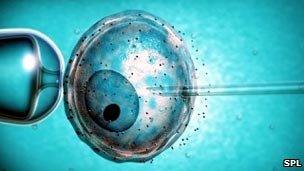The cost of fertility treatment 'tourism'
- Published

Nearly four million babies have been born using IVF
BBC Radio Scotland's The Investigation programme examines the increasing number of couples travelling abroad to seek infertility treatment.
It is described as one of the fastest growing areas of medical "tourism" although that is a word none of those undertaking this journey like to use.
But is it costing too much in terms of emotional, physical and financial stress?
One couple, interviewed anonymously for BBC Scotland's The Investigation programme, said they had spent £90,000 already, and after 17 treatments in various places, including the US, are heading to Spain again this year for one last try at conceiving a longed-for baby.
This couple did not meet until their mid-30s, and by the time they went for treatment on the NHS, at 40 the patient was deemed too old to qualify by her local health board.
The couple have had to remortgage their house to raise funds, so the financial pressure has been enormous, but they have also been on an emotional and physical rollercoaster. And two miscarriages have made it all the more devastating.
It should be the most natural thing in the world, starting a family when the time is right, but for many thousands, it just does not happen.
Fertility decline
Growing numbers choose to take the overseas route to pregnancy, driven by a desperate desire to have a child of their own.
Professor Richard Fleming, director of the Glasgow Centre for Reproductive Medicine, said that the root cause was because women were starting their families later in life. Scientific studies have shown that human fertility starts declining at the age of 31, which is the age many women are having their first babies.
By the mid-30s, eggs are of poor quality, and chances of natural conception have decreased considerably, and even IVF, the professor said, struggles to make up the shortfall.
Prof Fleming is concerned that the general population are not aware of this sharp decrease in fertility. He said it was not the age of the patient that counts, but the age of the eggs.
A number of studies have looked at the reasons people go abroad for treatment. The Infertility Network UK carried out an online fertility tourism survey, which produced some surprising results.
They found that 76% of those who responded would consider travelling overseas for treatment. Of those, 70.5% said it was because of shorter waiting times than in the UK, 69.5% gave the cost of treatment as a reason, and 61% pointed to the success rates of conception in clinics abroad.
Donor anonymity
The availability of donor eggs and sperm was also an important element in their choice.
Availability is a crucial issue in the UK. There are huge waiting lists everywhere for donor eggs and sperm.
Five years ago the government lifted the anonymity granted to donors, so that now any offspring conceived by the donor method, are able to trace their biological parents when they get to the age of 18.
Juliet Tizzard, policy director of the Human Fertilisation and Embryology Authority (HFEA), believes this was the right thing to do, but donor numbers have declined, and many people go abroad particularly because there is still anonymity, and many donors prefer it too.
In Europe it is not allowed to pay donors a fee, but they may be paid "compensation" for their time and trouble. In the UK it is expenses only, up to a limit of £250, but in Spain, a favourite venue for those seeking treatment, donors will receive €900. In Europe much younger donors are used, often students, whose eggs are at their most fertile.
Varying treatments
Costs of treatments vary, too, with an IVF cycle in the UK costing up to £4,500, or with donor eggs up to nearly £6,000.
Those going abroad also have to build in the cost of travel and accommodation, and, of course, time off work.
A European Union directive, in force since 2007, focuses on the safety and laboratory practice at all fertility clinics in the EU, and last week the European Society for Human Reproduction and Embryology (ESHRE) issued a new code of practice to ensure high standards of care for patients.
In Scotland, it is the health boards who determine how much NHS treatment infertile patients may have, and it varies from one area to another.
Some offer two cycles, some three; for all the cut-off point is at 40 years of age, and there are other criteria, such as whether there are already any other children living in the home.
Gwenda Burns, Scottish co-ordinator of the Infertility Network, is calling for an acceptable waiting time in each health board area, and fairness for all those who need help with their fertility, which has been recognised as an illness by the World Health Organisation.
But she also said people must be realistic and call an end to treatment when there is no chance of it working, just as you would with any other illness.
The Investigation was broadcast on BBC Radio Scotland on Sunday 24 April at 1030 BST.
- Published25 February 2011
- Published29 September 2010